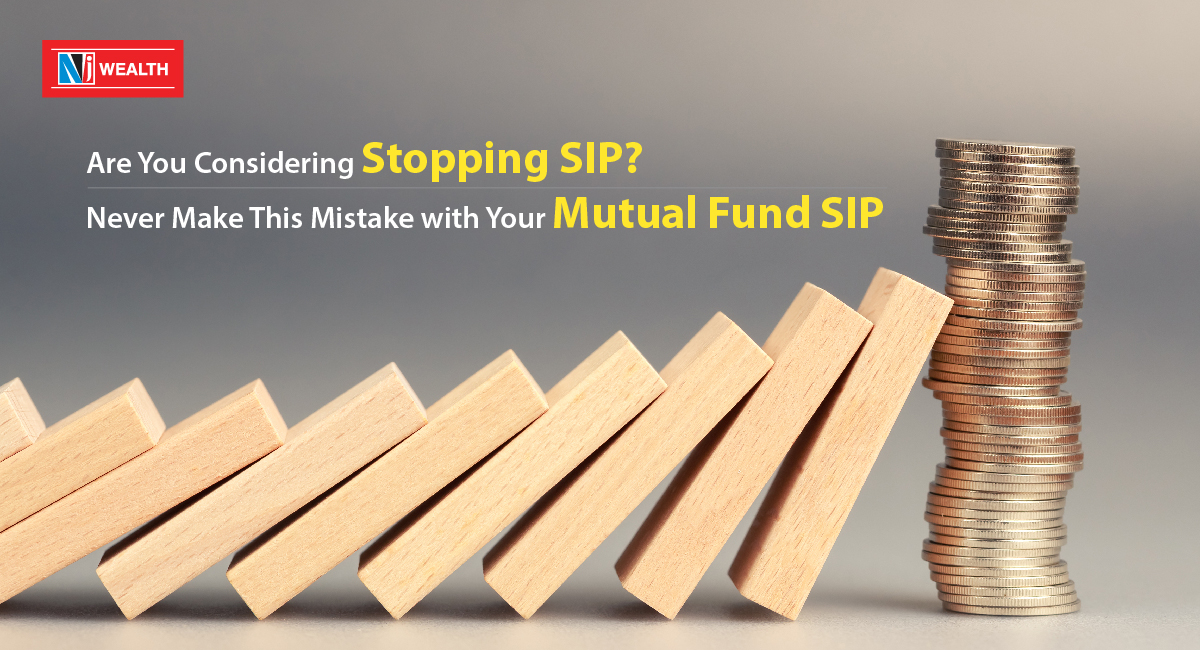Are You Considering Stopping SIP? Never Make This Mistake with Your Mutual Fund SIP
Who doesn't want to build wealth? As awareness of investment routes is spreading, the popularity of mutual fund investments via SIPs (Systematic investment plans) is gaining momentum among people looking to build wealth over the long term. However, many investors also consider stopping SIPs at various junctures of life and in times of need and using the accumulated corpus away. They wonder whether they should continue their SIP or halt it altogether. This blog will explore this dilemma and highlight a crucial mistake investors should avoid at all costs.
Why Stopping SIP Is A Bad Idea?
The Dilemma of SIP
Many investors naturally reassess their financial strategies when the market sees ups and downs or economic conditions change. While it's an excellent habit to assess and adjust investments as and when necessary, stopping them midway is not. Continuing your SIPs for the long term can result in fulfilling financial needs and building wealth. Investors investing for the long term can benefit from the magic of compounding. So, if someone stops it after a few months or years, the opportunity loss is comparatively high.
The Magic of Consistency
Often, investors undermine the role of discipline and consistency in a successful investment strategy. They shape the financial journey and make it easier and hassle-free to continue if imbibed right. And what could be better than Mutual Fund SIPs in catalysing the effect? SIPs allow investors to build wealth over time through timely contributions. When investors keep investing in SIP even during turbulent times, they benefit from rupee-cost averaging, i.e., buying more units when prices are low and fewer units when prices are high. This strategy helps pacify the effects of market volatility and can enhance long-term returns.
The Cost of Timing the Market
It is risky to attempt to time the market by stopping SIPs during downturns and restarting them when the market rebounds. Accurately predicting market moves is essential for market timing, and even seasoned investors may not be able to do it consistently. The best-performing days are usually preceded by periods of sharp decline; thus, staying invested often means seizing prospective rewards.
For instance, two friends, Akash and Saurav, started an SIP of Rs. 10,000 in equity mutual funds 20 years ago. Akash panicked in the volatile market and stopped his SIP for four years and then restarted it, while Saurav kept doing his regular SIP investment for 20 years. As of March 2024, Akash had accumulated Rs. 82.26 lakh*, while Saurav had accumulated Rs. 1 crore*. Hence, don't stop your SIP to build wealth in the long run.
*Assuming investment in Equity Fund and an average return of 12.64% p.a. as per AMFI Best Practices. Guidelines Circular No. 135/BP/109/2023-24 dated November 01, 2023. Disclaimer: Past performance may or may not be sustained in future and is not a guarantee of any future returns.
Preventing Error
The biggest mistake investors can make with their mutual fund SIP is to completely stop it during brief market fluctuations. Although it's normal to be anxious during such times, sticking with the approach and the SIP will eventually produce better outcomes. Investors should focus on long-term financial needs and the power of compounding rather than on short-term swings.
When to Reassess
It's important to avoid rash choices, but there are good reasons to review the SIP approach at regular intervals. One should consider adjusting the investment strategy in the wake of events like a change in income or financial needs or when the state of the market changes. In such life events, investors should seek guidance from their mutual fund distributors to assess their options and come to a well-informed decision as per their needs.
Hence, in the world of finances and investments, discipline and consistency are the game changers in the long haul. Even while market turbulence could urge one to stop investing in mutual funds, persisting with it can provide far better long-term results. So refrain from giving up on SIP in reaction to temporary shifts; instead, pay attention to the financial needs and the compounding effect that SIP gives.
